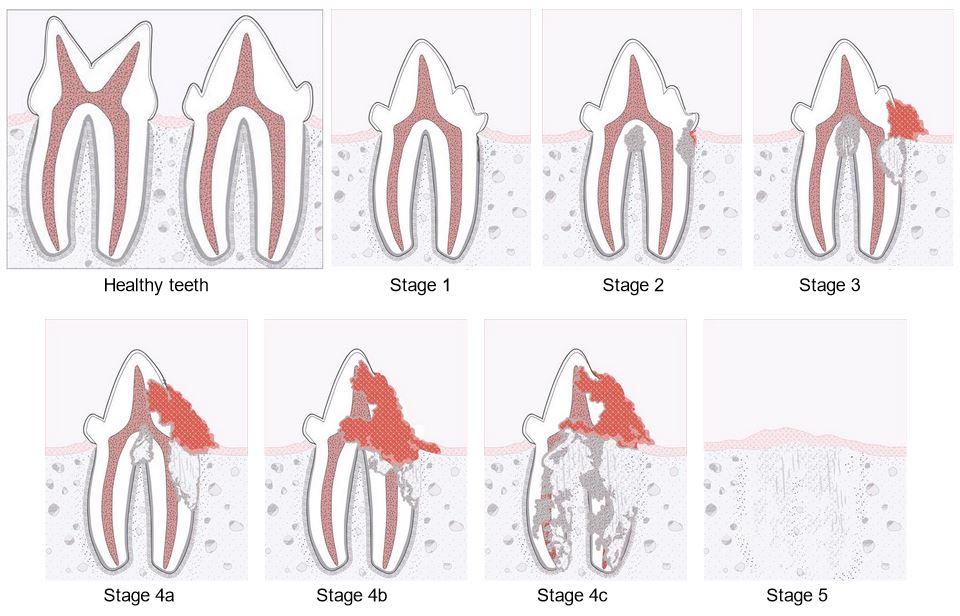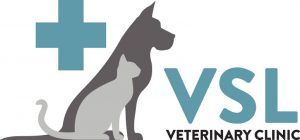Tooth Resorption in Cats
Does your cat drool, sneeze excessively, shake/rub their head, or struggle to eat? Then your cat may suffer from tooth resorption.
Don’t worry! VSL vet Dr. Nadja reveals everything you must know about tooth problems in cats.
What is tooth resorption
Did you know one study found that more than 50% of cats are affected by this dental disease?
Tooth resorption happens when cells called odontoclasts, which are normally dormant, become activated and start to eat away at the tooth. Resorption most commonly affects the back teeth and starts at the junction of the gum and the tooth enamel.
The reason for re-activation of these odontoclasts is unknown, but theories supporting an autoimmune response, calicivirus, and metabolic imbalances relating to calcium regulation have been proposed.
If left untreated, the tooth will be eaten away entirely over many months, and the process is extremely painful. There are five stages; in the earlier stages the lesions are not always easy to find because they start to appear under the gums at the roots.

All diagrams from: https://avdc.org/avdc-nomenclature/
Symptoms of tooth resorption
Does your cat show one or more of these symptoms?
- hypersalivation
- chewing mostly on one side
- problems eating dry food or loosing food while chewing
- vocalization while eating
- head shaking
- jaw chattering
- sneezing
- anorexia and weight loss
- oral bleeding
- difficulties with prehension
- gagging
- face rubbing
Then it is possible that your cat suffers from this disease. Cats often try to hide pain instinctively, which means they suffer in silence.
Who is affected by tooth resorption?
Purebred cats are affected more often than mixed breed cats. Predisposed breeds include the Abyssinian, Siamese, Russian blue, Scottish fold, Oriental shorthair, and Persian.
Tooth resorption is rarely diagnosed in cats less than 2 years of age. Most affected cats develop lesions by 4-6 years of age. One study found that, on average, three teeth were affected.
The lesions become more common with increasing age, and the older the cat is the more teeth are likely to be affected.
Why do cats get tooth resorption?
There have been several studies to date, which have identified some risk factors, but the exact cause is still not yet known.
Besides genetics, it may be influenced by the lifestyle of cats, such as:
- cats that gulp rather than chew
- feeding human food
- drinking tap water
- eating raw liver
- low calcium diets
- high magnesium diets
- regular exposure of teeth to acids (e.g. stomach acid from vomiting, or highly acidic foods)
- indoor lifestyle
- other periodontal diseases
- infection with feline calicivirus and feline immunodeficiency virus (FIV)
So, how to prevent tooth resorption and treat once it occurs?
How to prevent tooth resorption?
Prevention is better than cure! The best way to prevent this is to observe your cats’ eating habits and watch out for the above listed abnormalities. VSL recommends an annual health check, at which the teeth are examined thoroughly.
Your vet can then provide advice on maintenance of good dental hygiene for cats – which may include brushing with pet toothpaste if they will let you!
- Cat annual health check (nose to tail): 33$
- Cat dental scaling & polishing: 66$ (can vary, depending on severity of dental work needed)
Book your cat’s annual health check or teeth cleaning: 023 986 640 (English)
As always, detecting and treating minor health issues early on is easier (and less expensive) than dealing with chronic health problems that have progressed to a severe state.
How to treat tooth resorption?
If a tooth is affected, the best treatment is to remove this tooth. Cats can live a normal life even with no teeth left, especially if they are offered wet food. In order to determine if removal of any teeth is necessary, the vet will recommend that your pet undergo a dental scaling & polishing under general anaesthesia.
About cat dental scaling & polishing
Your cat will be admitted to the clinic for the day, and under general anaesthesia the entire mouth will be thoroughly examined, including the removal of built-up tartar from all teeth with our ultrasonic dental scaler and polishing of all teeth.
If we discover any diseased teeth that require extraction, it is an additional $5.50 per simple extraction for teeth with only one root, and $16.50 per complex extraction for teeth with more than one root. Additional costs for pre/post operative medications and General Anesthesia will incur, based on dosage required. VAT included.
What’s next?
Do you have any questions? Would you like to book a health check or teeth cleaning?
The VSL vet team is here for you: 023 986 640.
